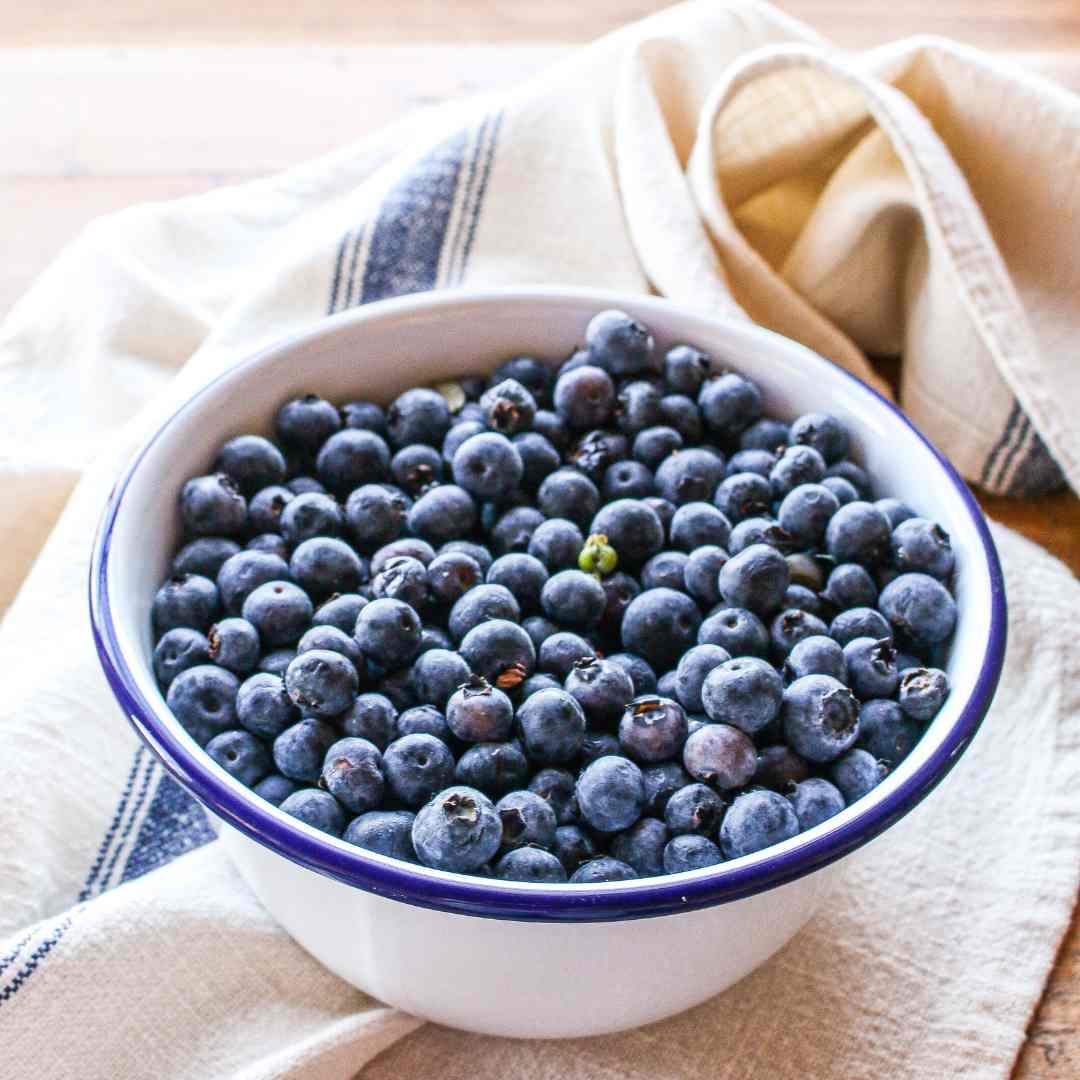
Delicious, healthy blueberries are worth celebrating in your kitchen! Learn all about how to use blueberries, including when blueberries are in season, how to freeze blueberries, blueberry recipes, and the difference between wild blueberries and farm-grown blueberries in this guide to enjoying blueberries the healthy way.
Blueberries—glistening like gems—are one of our most celebrated fruits. Rightly so, as these colorful berries hold a special place in American history, dating back hundreds of years in Native American culture, where they were called “star berries” for the five-point “star” at the blossom end of the berry. The Native Americans treasured blueberries, collecting them and using them as a favorite ingredient in many traditional dishes. I grew up with blueberries in the Pacific Northwest, where they grow abundantly and I picked them in the wild. And they are also grown in Europe; I’ve enjoyed picking wild blueberries in Sweden on many an occasion (pictured below). Blueberries are a delicious, nutritious addition to your kitchen, so learn how to harness their benefits with my guide on how to use blueberries in the kitchen.
Blueberry Nutrition
Colored deep blue to purple-black, blueberries are bursting with powerful nutrition. Just one cup is packed with 36% DV (Daily Value, based on 2,000 calories/day) of vitamin K, 24% DV of the antioxidant vitamin C, and health-protecting phytochemicals, such as anthocyanins, which give blueberries their beautiful color and antioxidant activity.
Those anthocyanins are especially significant for protecting the brain, particularly in older adults. The compounds have also been found to be beneficial for protecting against type 2 diabetes and certain types of cancer. In fact, the benefits are so strong I try to include them in my diet (fresh in season, and dried or frozen when they are out of season) at least a few times per week. Learn more about berry benefits here.
How to Grow Blueberries
A relative of azalea, blueberries grow on small bushes, and are suitable for growing in many locations. Plant young blueberry bushes about 3 feet apart in a sunny location during the spring (late April or May). There are many varieties—the most common of which is highbush blueberries. Many varieties of blueberries exist that are suitable for various growing climates. When are blueberries in season for harvest? Blueberries are typically ready to be picked between June and August—just look for the berries to turn blue as a sign they are ready to be picked.
Wild Blueberries
It’s only relatively recently that modern blueberries have been cultivated. Before that, they were only available in their wild form. Wild blueberries grow on their own in blueberry barrens. Wild blueberries are much smaller and has a much deeper flavor and higher level of antioxidant compounds than cultivated berries.
How to Store Blueberries
When you bring your blueberries home from the farmers market or supermarket, refrigerate them quickly on the shelf in the container they came in, or transfer them to an uncovered container. Do not store in an airtight container so they don’t to avoid trapping moisture and developing mold. Don’t rinse your berries until you are ready to use them. How long do blueberries last? Depending on when your berries were harvested and how ripe they were at the time, you generally have up to one week before your berries may start spoiling. Watch for softened berries as a sign of spoilage. When fresh blueberry season is over, you can enjoy dried blueberries or frozen blueberries as a nutritious, delicious option.
How to Use Blueberries in the Kitchen
Blueberries are so versatile! You can enjoy them by the handful fresh and natural, plus they are good in salads, cereals, smoothies, baked goods, and even savory dishes. Can dogs eat blueberries? Yes! They are super foods for our canine friends, too. So take advantage of blueberry season when it is in full swing, and really enjoy these delicious berries while you they are fresh and delicious. Here are my top tips and recipes on how to use blueberries.
Top 5 Tips for Using Blueberries in the Kitchen
1. Top Your Cereal
One of my favorite ways to do blueberries is to just heap them on top of my morning steel cut oats or breakfast cereal. They are also great over muesli, overnight oats, whole grain breakfast flakes, smoothie bowls, and other whole grain porridges. Add some walnuts, flax, sunflower seeds, almonds, or hemp seeds, a splash of soymilk, and you’ve got a smart breakfast in seconds.
2. Purple Up Your Smoothie
You can make any smoothie even better with a handful of blueberries. In fact, they will disguise the taste and color of greens (for those veggie-shy individuals) in the greenest of smoothies. Try this Purple Power Smoothie for an adventurous start.
3. Make Better Baked Goods
Stir blueberries into all of your favorite baked recipes, including breads, muffins, pancakes, cookies, and bars. Try small, wild blueberries or dried berries for the best results.
4. Use as a Savory Sidekick
The deep, sweet bite of blueberries is the perfect backdrop for savory dishes. Mix up a blueberry salsa to serve with black bean tacos, create a blueberry chutney to go with your next veggie ball or lentil patty recipe, and toss them into a whole grain or green salad.
5. Whip Up a Healthier Dessert
It just doesn’t get any better than a blueberry-centric dessert. Not only are blueberries nature’s most delicious dessert filling, they can power up your dessert into a healthful, lower-sugar option you won’t have to feel a bit guilty about. Try blueberry pies with oat crumb toppings, blueberry-filled bars, blueberry sorbet, or this amazing recipe for Chia Seed Pudding, featuring, you guessed it, blueberries. Check out my video on how to make it here!
For other guides on using plant foods in the kitchen, check out the following:
How to Grill Artichokes
How to Cook Bitter Melon
How to Use Sweet Potatoes
How to Use Carrots
How to Cook with Stinging Nettle
